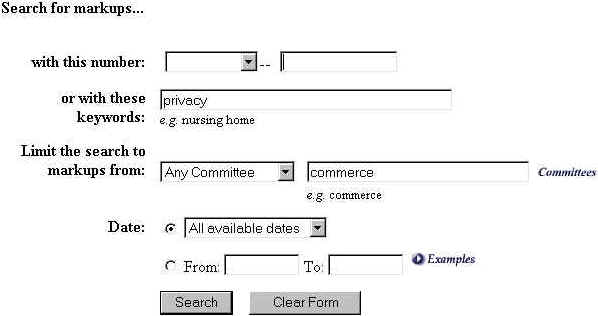
Committee Voting Records
Congressional Universe has a Committees database that will allow you to access committee and subcommittee votes. Below is a search for action by the Commerce Committee on bills that have the word "privacy" as part of their text. Note that there is a field to select which committee you wish to search. If you are interested in a subcommittee, you must put the name of the subcommittee in the "keywords" slot along with your search term--if you have one. You could simply look at all subcommittee action by using the subcommittee's name as a search tem. The second search below is just such a search.
Finally, this database is new. Coverage begins in 1999. Unless you are certain of a date, it's probably best to set the date delimiter to "All Available Dates."

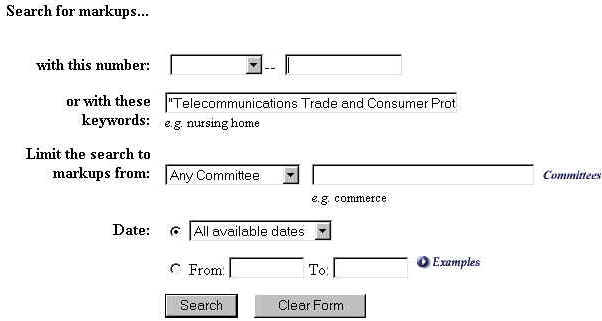
Our nation is founded in part on the notion that government ought to be as transparent to the people as possible. "Transparency" in this context means that the workings of government, i.e. the making, and enforcing, of laws should not be done in secret. It is for this reason the Freedoms of Speech and of the Press are included in the Bill of Rights. It is for this reason, for instance, that all executions are required by law to have witnesses. It is for this reason that upon request every sheriff in this country is required to hand over a list of prisoners in the county jails. It is for this reason that the salaries of public officials (like your teachers, for example) are available for the asking. It is for this reason that government bodies are not allowed, except under specific--and exceptional--circumstances, to meet privately. It is for this reason that public notice must be given of any public body's (like the city council) intention to meet and that the agenda must be published. And so on. The people must be able to observe the government and they must be able to address it both in print and electronic media and in person.
One of the ways that federal, state, and local governments achieve transparency is by soliciting or, sometimes, compelling (by subpoena) public testimony from government officials and citizens. The testimony has a two fold purpose, to allow the people's voice to be heard, and heard in public, regarding proposed legislation and, by creating a record (produced under oath), holding people publicly accountable for actions or legislation possibly, or in fact, beneficial or injurious to the nation. If you are a bit hazy about the legislative process click here.
Congressional testimony is usually delivered by experts of one kind or another or by people close to an issue. When Firestone tires were identified as causes of fatal wrecks, congress demanded that the President of Firestone and of Firestone's parent company testify regarding the origin of, and responsibility for, the problem. After the space shuttle Challenger exploded, Congress listened to famed physicist, Richard Feynman, explain how and why the explosion occurred. Reading congressional testimony is also a way to learn about both sides of a controversial issue. Advocates for or against a proposed piece of legislation will usually be called to testify (or will see to it that they are called), as, for instance, during recent debates on embryonic stem cell research and human cloning. Statistics are also important part of much of the testimony. Statistics that can be found nowhere else, except with great difficulty, can be easily located here.
If you are a bit hazy on how bills become law and where committees, subcommittees and the like fit in, click here.
There are two ways to get congressional testimony over the web, using Congressional Universe's Testimony database or using Thomas, a web site provided by the Library of Congress. Congressional Universe's database is the way to go if you have access to it--which you do on campus. However, off-campus you will have to use Thomas. Thomas is free and it works well, but it simply does not contain the depth of information that Congressional Universe does.
Accessing Congressional Universe: Only works on-campus.
Go to the Congressional Universe link provided on the library's alphabetical listing of databases. Once you are in Congressional Universe, click on the Testimony icon.
Accessing Thomas: Accessible from any Internet connected computer.
Go to the Thomas home page at http://thomas.loc.gov/
Congressional Universe's Testimony Database
Your search structure should look very much like below:
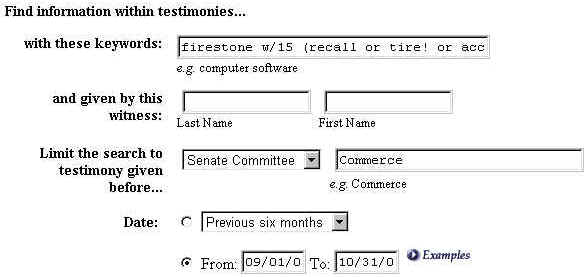
Copyright © 1995, 1996, 1997, 1998, 1999, 2000, 2001 Lexis-Nexis, a division of Reed Elsevier Inc. All rights reserved. Reprinted with the permission of Lexis-Nexis.
The first item on your testimony list after you have resorted the results using the Relevance function and clicked on Expanded List should look as below:
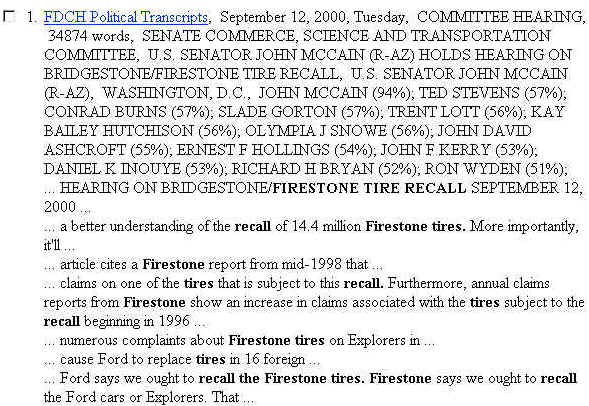
Copyright © 1995, 1996, 1997, 1998, 1999, 2000, 2001 Lexis-Nexis, a division of Reed Elsevier Inc. All rights reserved. Reprinted with the permission of Lexis-Nexis.
When you open this testimony, you will see that it is quite long. That's because a fair number of people testified that day and all their testimony is "bound" together. There is a way to get around having to wander through the testimony, looking for what is relevant--use the "Find in page" function. In both Netscape and Internet Explorer this function is located under "Edit" on the Windows tool bar. Use a word that you know is relevant to your topic. In this case "tire." See below.

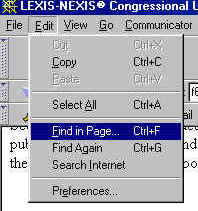
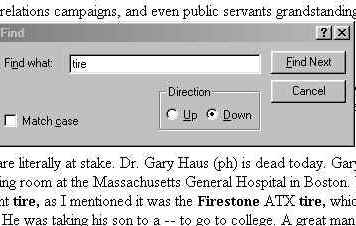
Copyright © 1995, 1996, 1997, 1998, 1999, 2000, 2001 Lexis-Nexis, a division of Reed Elsevier Inc. All rights reserved. Reprinted with the permission of Lexis-Nexis.